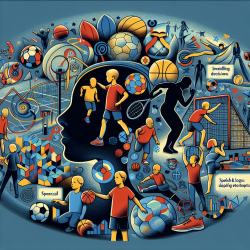Introduction
Adolescence is a critical period of development characterized by rapid growth, increased autonomy, and heightened stress. Peer relationships become central during this time, and peer stress can significantly impact adolescents' life satisfaction. However, recent research highlights the protective role of ethnic identity in buffering the negative effects of peer stress on life satisfaction among adolescents. This blog will explore how practitioners can leverage these findings to improve outcomes for adolescents.
Understanding the Research
The study titled Exploring the Moderating Role of Ethnic Identity in the Relation Between Peer Stress and Life Satisfaction among Adolescents by Topps and Jiang (2023) examined how ethnic identity moderates the relationship between peer stress and life satisfaction. The study involved 417 adolescents from diverse ethnic backgrounds and found that ethnic identity significantly buffers the negative impact of peer stress on life satisfaction, especially for African American adolescents.
Key Findings
- Ethnic identity positively correlates with life satisfaction.
- Peer stress negatively impacts life satisfaction.
- Ethnic identity buffers the negative effects of peer stress on life satisfaction, particularly for African American adolescents.
Implications for Practitioners
These findings have significant implications for practitioners working with adolescents. Here are some actionable steps to consider:
1. Promote Ethnic Identity Development
Encourage adolescents to explore and embrace their ethnic identity. This can be done through:
- Group counseling sessions focused on ethnic identity exploration.
- School-based interventions like culturally responsive programs.
- Family and community activities that celebrate cultural heritage.
2. Address Peer Stress
Help adolescents develop coping strategies to manage peer stress. This can include:
- Teaching stress management techniques such as mindfulness and relaxation exercises.
- Providing social skills training to improve peer interactions.
- Creating a supportive school environment that fosters inclusivity and reduces bullying.
3. Tailor Interventions to Ethnic Groups
Recognize that the impact of ethnic identity and peer stress may vary across different ethnic groups. Tailor interventions to address the unique needs of each group. For example, African American adolescents may benefit more from programs that strengthen ethnic identity as a protective factor against peer stress.
Encouraging Further Research
While the current study provides valuable insights, there is a need for further research to understand the nuances of ethnic identity development and its protective role across different stressors and ethnic groups. Practitioners are encouraged to engage in or support research efforts that explore these dynamics in more depth.
Conclusion
Ethnic identity plays a crucial role in protecting adolescents from the negative effects of peer stress on life satisfaction. By promoting ethnic identity development and addressing peer stress, practitioners can significantly improve the well-being of adolescents. For more detailed information, practitioners can refer to the original research paper.
To read the original research paper, please follow this link: Exploring the Moderating Role of Ethnic Identity in the Relation Between Peer Stress and Life Satisfaction among Adolescents.










